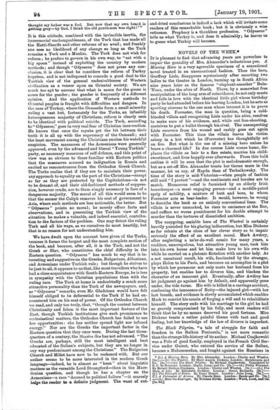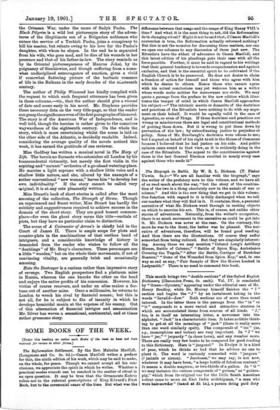NOVELS OF THE WEEK.*
IT is pleasant to find that advancing years are powerless to impair the geniality of Mrs. Alexander's industrious pen. A
Missing Hero is a very agreeable specimen of a sensational novel treated in an unsensational fashion. Thus the hero, Geoffrey Lisle, disappears mysteriously after escorting two ladies to the theatre in London, turning up in South Africa
nine years later as the famous " elephant-smasher " Bulu- 'Nzau, under the alias of North. There, by a somewhat free manipulation of the long arm of coincidence, he not only meets and fnlis in love with the identical little girl whose birthday party he had attended before his leaving London, but he acts as sporting cicerone to the one man whose interest it is to prove his death. Forrester, the man in question, being a cold- blooded villain and recognising Lisle under his alias, resolves to make sure of his evidence, and, while out lion-shooting, contrives to put a bullet through his rival. The unsuspecting Lisle recovers from his wound and rashly goes out again with Forrester. This time the villain leaves his victim asleep in a hut which he (Forrester) has thoughtfully set on fire. But what is the use of a missing hero unless he bears a charmed life? In due course Lisle comes home, dis- places the villain as heir to a fine estate, marries his child- sweetheart, and lives happily ever afterwards. From this bald outline it will be seen that the plot is melodramatic enough, but as a set-off Mrs. Alexander treats her theme more in the manner, let us say, of Haydn than of Tschaikowsky. The time of the story is mid-Victorian—when people of fashion still said "I protest "—and the sentiments and heroine are to match. Humorous relief is furnished by an elderly Irish housekeeper—a most engaging person—and a muddle-pated sprig of nobility, a mixture of butt and bore, to whom Forrester acts as bear-leader. It would, however, be wrong to describe the book as on entirely conventional lines. The villain is never unmasked, he rises to eminence at the Bar, and suffers no worse peniehment for his double attempt to murder than the tortures of dissatisfied ambition.
The easygoing, amiable hero of The Wastrel is certainly heavily punished for his glaring indiscretion, but Miss Dickens so far relents at the close of her clever story as to impair seriously the effect of an excellent moral. Mark Awdrey, after neglecting a ne'er-do-well cousin for many years, a reckless, unscrupulous, but attractive young man, took him into his own house and let him make love to his own wife while he carried on a platonic flirtation with another lady. As a not unnatural result, his wife, fascinated by the stranger, plays Helen to his Paris, and becomes an accomplice in a plot by which her paramour not only ousts her husband from his property, but enables her to divorce him, and blacken the character of an innocent girl. Eventually, after Awdrey has let judgment go against him by default, and apparently gone under, the tide turns. His wife is killed in a carriage accident, confessing the innocence of Betty—the injured girl—with her last breath, and evidence is slowly accumulated which enables Mark to convict his cousin of forging a will and to rehabilitate himself. The story ends with his marriage to the girl he had so gravely compromised by his folly, and most readers will think that he by no means deserved his good fortune. Miss Dickens treats a rather painful theme with tact and good feeling, but her knowledge of the law of divorce is imperfect.
The Black Pilgrim, "a tale of struggle for faith and freedom in the Balkan Peninsula," is not more romantic than the strange life-history of its author. Michael Czajkowski was a Pole of good family, employed in the French Civil Ser- vice under Guizot, who entered the service of the Sultan, became a Mahommeda,n, and fought against the Russians in
• (1.) A Mining Hero. By Mrs. Alexander. London : Cliatto and Windus. r6s.].) The Wastrel. By Mary Angela Dickens. London : Hutchinson and Co. [6s. —(3.) The Black Pilgrun. By Michael Czajkowski. Translated by S. C. de Soissons. London : Digby, Long, and Co. [6s.]—(4.) Philip Winisood.
--I
awl By Robert Neilson Stephens. London: Chatto and Windus. [6s.] 5. The Harp of Life. By Pli,abeth Godfrey. London : Grant Richards. 68, —
(6.) The Strength of Straw. By Estne Stuart. London : John Long, 62, —
(7.) A Cuirassier of Arrans. By Claude Bray. London : Sands and . 6s.] —(8.) Bate the Destroyer, By Homan Silver. London ; Ward, Look, Oo. Da. td.)
the Crimean War, under the name of Sadyk Pasha. The Black Pilgrim is a wild but picturesque story of the a,dven- tares of the illegitimate son of a Bulgarian nobleman who enters the service of a Turkish Pasha, joins a conspiracy to kill his master, but relents owing to his love for the Pasha's daughter, with whom he elopes. In the end he is separated from his wife, who goes mad, and he dies of his wounds in her presence and that of his father-in-law. The story reminds us by its Oriental picturesqueness of Ma,urus Jokai, by its poignancy of Sienkiewicz, and though suffering from a some- what undisciplined extravagance of emotion, gives a vivid if somewhat flattering picture of the barbaric romance of life in the Balkans in the early decades of the niAeteenth century.
The author of Philip Winwood has kindly complied with the request to which such frequent utterance has been given in these columns,—viz., that the author should give a re,surag of date and scene early in his novel, Mr. Stephens provides these necessary data on the very title-page, so that the reader can grasp the significance even of the first paragraphs of his novel. The story is of the American War of Independence, and is well told, though the heroine is rather given to the conscious waywardness of the eighteenth century. On the whole the story, which is more entertaining whilst the scene is laid on the other side of the Atlantic, is decidedly readable. Indeed, considering the average quality of the novels noticed this week, it has earned the gratitude of one reviewer.
Miss Godfrey has written a musical novel in The Harp of Life. The hero is no Sarasate who astonishes all London by his transcendental virtuosity, but merely the first violin in the aspiring and" earnest" orchestra of a go-ahead watering-place. He marries a light soprano with a shallow little voice and a shallow little nature, and she, allured by the example of a rather conventional 'new woman," leaves him " to develop her own individuality." If the story cannot be called very Qriginal, it is at any rate pleasantly written.
Miss Stuart's book of short stories is called after the most amusing of the collection, The Strength of Straw. Though an experienced and fluent writer, Miss Stuart has hardly the subtlety and suggestiveness required to achieve success in the domain of the short story. They are good honest common- place—for even the ghost story earns this title—recitals of plots, but they have no particular claim to distinction.
The scene of A Cuirassier of Arran's is chiefly laid in the Court of James IL There is ample scope for plots and counter-plots in the machinations of that restless band of intriguers, and a considerable knowledge of history is demanded from the reader who wishes to follow all the " doublings " of Mr. Bray's characters. These personages are a little "wooden," but on the whole their movements, if not of convincing vitality, are generally brisk and occasionally amusing.
Hate the Destroyer is a curious rather than impressive story of revenge. Two English prospectors find a platinum mine in Russia, whereon the one knocks the other on the head and enjoys the entire profits of his concession. However, his victim of course recovers, and under an alias makes a for- tune out of another mine. Once a millionaire, he returns to London to wreck his rival by financial means; but this is not all, for he is subject to fits of insanity in which he develops homicidal mania at the expense of his enemy. Out of this alternation of financial intrigue and assassination Mr. Silver has woven a sensational, sentimental, and at times rather gruesome story.







































 Previous page
Previous page